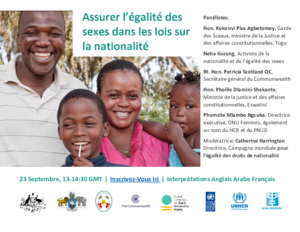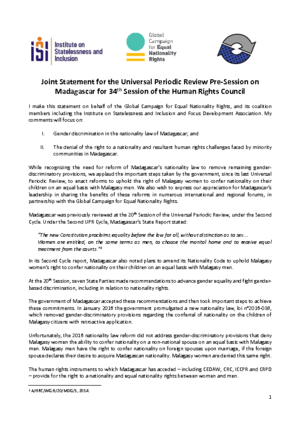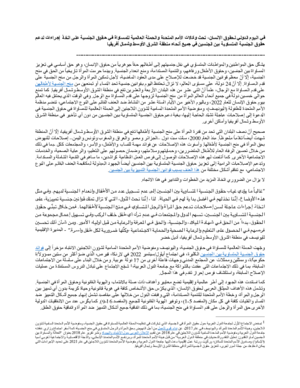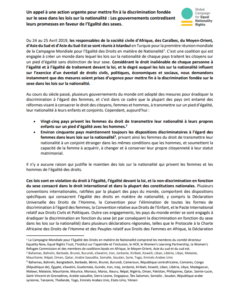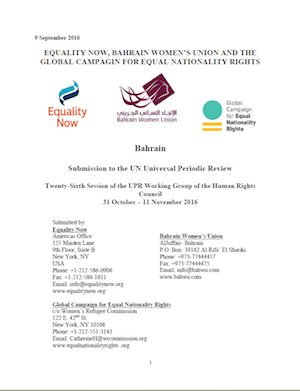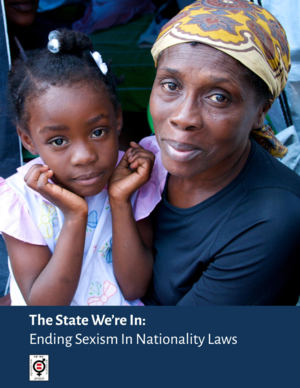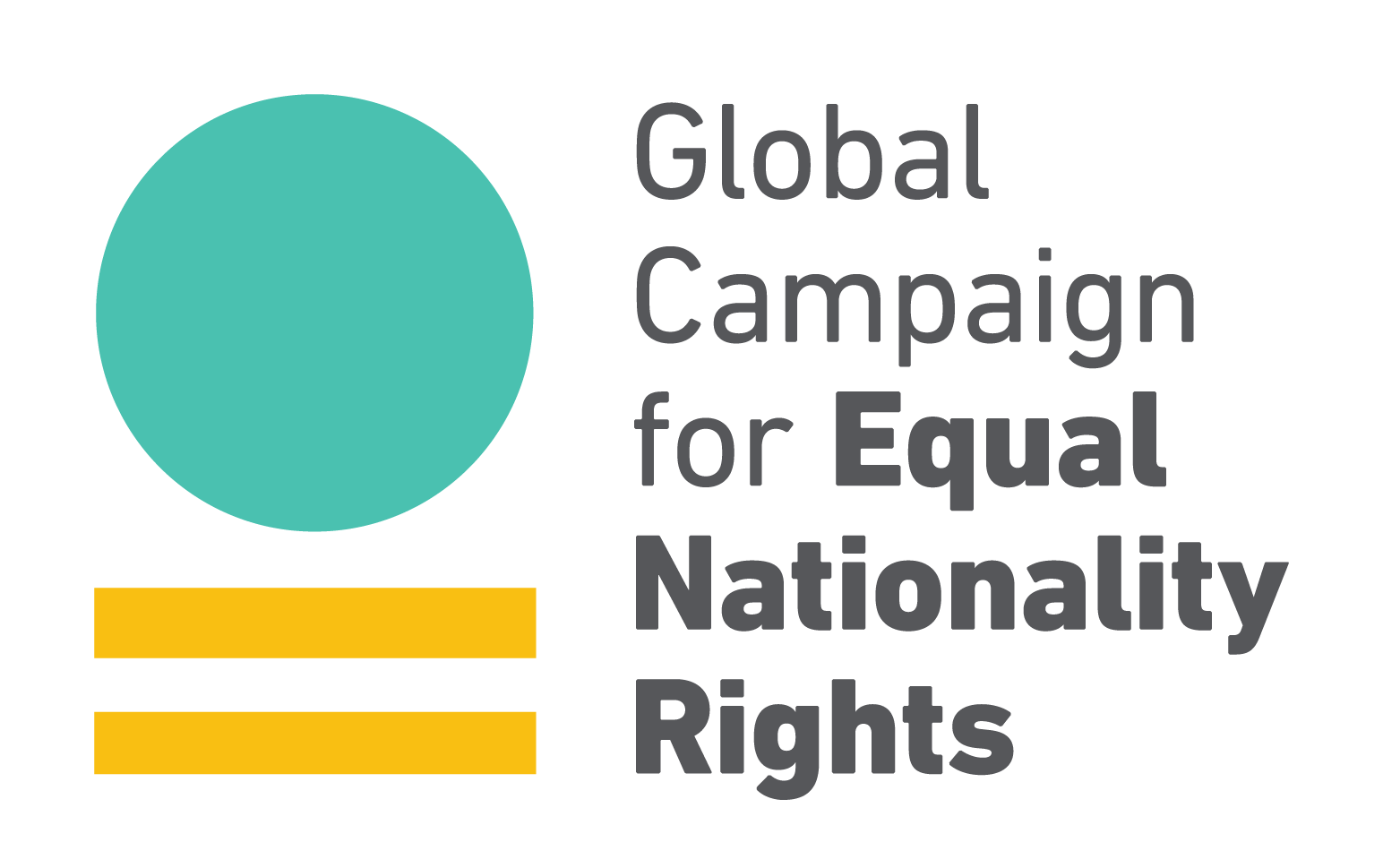Reports
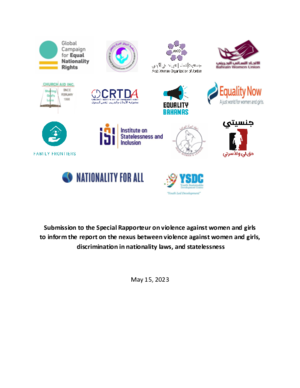
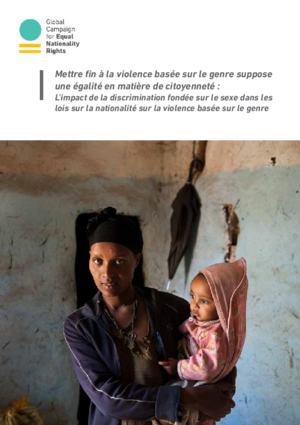
L’événement: Assurer l’égalité des sexes dans les lois sur la nationalité – Note conceptuelle
Published: September 17, 2020
Sept 23 High Level Event “Achieving Gender Equality in Nationality Laws” – Concept Note
Published: September 10, 2020
The Impact of Gender Discrimination in Nationality Laws on Gender-Based Violence
Published: July 29, 2020
Gender-based violence (GBV) is strongly rooted in inequality and discrimination against women in social, political, civil, and economic life. While changes to social norms and practices to uphold women’s equality are needed, legal equality is essential to addressing GBV.
In one out of four countries globally, discriminatory nationality laws require reform to uphold women’s equality and effectively combat GBV.
Gender discrimination in nationality laws results in wide-ranging human rights violations, is a primary root cause of statelessness, and contributes to multiple forms of gender-based violence, as described in this brief guide.
Call to Action: Addressing Discrimination and Inequality in the Global Response to COVID-19
Published: May 07, 2020
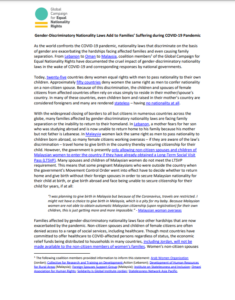
Gender-Discriminatory Nationality Laws Add to Families’ Suffering during COVID-19 Pandemic
Published: April 16, 2020
Gender Discrimination and Childhood Statelessness (Arabic publication)
Published: October 30, 2019
Gender discrimination in nationality laws is a root cause of childhood statelessness. Gender-discriminatory policies and practices also contribute to statelessness among children.
Children rendered stateless by gender-discriminatory laws and practices are often unable to enjoy a broad range of human rights, including family unity, freedom of movement, and access to education, healthcare, and a range of social services.
In this report:
-
What is gender discrimination?
-
Countries with gender-discriminatory nationality laws regarding the conferral of nationality on children
-
Why does gender discrimination contribute to statelessness among children?
-
What is the impact of gender discrimination in nationality laws and statelessness on children?
-
Children currently and formerly affected by statelessness because of gender discrimination
-
International and regional instruments promoting gender equality in nationality laws
-
Regional declarations and protocols
-
The Global Campaign for Equal Nationality Rights
-
More information about gender discrimination & childhood statelessness
Click here for the English version of the report
Submission for the Universal Periodic Review of Madagascar: Gender Discrimination in the Nationality Law
Published: October 10, 2019
In this submission, Global Campaign for Equal Nationality Rights, and members Institute on Statelessness and Inclusion and Focus Development Association provide information to the Thirty-fourth Session of the UPR Working Group of the Human Rights Council to inform the Universal Periodic Review of Madagascar. The submission highlights concerns about gender discrimination in the law with regard to nationality in Madagascar and includes key recommendations for action by the government of Madagascar to better address this area of concern.
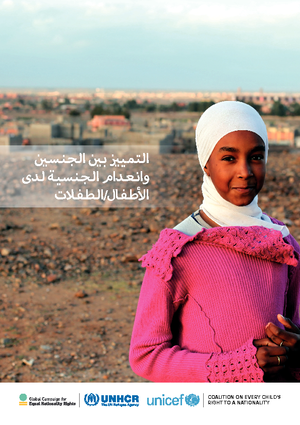
(Arabic) Global Campaign for Equal Nationality Rights call for urgent action to end gender discrimination in nationality laws
Published: May 01, 2019
عقدت قيادات المجتمع المدني من كلاً من أفريقيا ومنطقة البحر الكاريبي والشرق الأوسط وجنوب وجنوب شرق آسيا الاجتماع الدولي الأول للحملة العالمية من أجل حقوق متساوية في منح الجنسية في اسطنبول- تركيا، وذلك من 24 حتى 25 أبريل 2019. و تعد هذه الحملة كائتلاف ملتزم بتحقيق واقع تكون فيه قوانين الجنسية لكل دولة متساوية في التعامل مع مواطنيها بغض النظر عن نوعهم الاجتماعي. ولذلك ندعو بإلحاح للعمل بشكل عاجل نحو القضاء على التمييز الجندري في قوانين الجنسية. تأتي هذه الدعوة من قلب اعترافنا بالحق الغير قابل للمصادرة لكل فرد بمعاملة متساوية أمام القانون، وكذلك بالمدى الذي تؤثر فيه حقوق الجنسية على التمتع بحقوق مدنية و سياسية واقتصادية واجتماعية واسعة النطاق.
——
From April 24-25, 2019 civil society leaders from Africa, the Caribbean, the Middle East, South Asia and Southeast Asia convened in Istanbul, Turkey for the first global meeting of the Global Campaign for Equal Nationality Rights, a coalition dedicated to achieving a world where every country’s nationality law treats citizens as equals regardless of their gender. In recognition of the inalienable right of every person to equality and equal treatment before the law, and the extent to which nationality rights impact the enjoyment of a wide-range of civil, political, economic and social rights, we strongly call for urgent action to end gender discrimination in nationality laws.
CEDAW and Gender Discrimination in Nationality Laws
Published: February 22, 2017
There are a number of provisions of the Convention on the Elimination of All Forms of Discrimination Against Women (“CEDAW”) that are relevant to gender discrimination in nationality laws. This includes Articles 9, which explicitly obliges States parties to guarantee equal nationality rights, as well as provisions related to other rights guaranteed in CEDAW. This guide provides an overview of CEDAW Articles that are impacted by gender discrimination in nationality laws.
(ARABIC) On International Human Rights Day UN Agencies and Global Campaign for Equal Nationality Rights Urge Action to Uphold Gender Equal Nationality Rights across the Middle East-North Africa Region
Published: December 09, 2022
As the world marks Human Rights Day 2022 and the final day of the 16 Days of Activism Against Gender-Based Violence, the UN Children’s Fund (UNICEF) and the UN Refugee Agency (UNHCR) join the Global Campaign for Equal Nationality Rights in calling for urgent, much needed reforms to uphold gender-equal nationality rights without delay in MENA and elsewhere.
Citizens’ equal right to pass their nationality to their children is a fundamental human right, one that is essential to advancing gender equality, children’s rights and wellbeing, and sustainable development, and to preventing statelessness. While women were historically denied the right to confer nationality, over the past several decades most nationality laws have been reformed to enable women and men to confer nationality on an equal basis. Yet today 24 countries globally maintain nationality laws that limit or prevent women from conferring nationality on their children on an equal basis as men, with twelve of these twenty-four countries in the Middle East-North Africa (MENA) region. Almost fifty countries prevent women from conferring nationality on their spouse on an equal basis as men.
Click to read the full statement in Arabic. The English version may be viewed here.
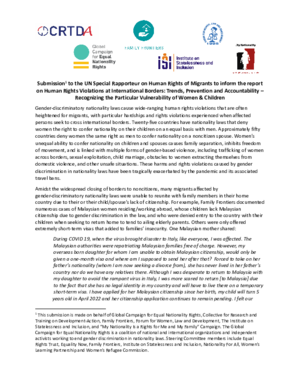
Submission to the UN Special Rapporteur on Migrants – Impact of gender discrimination in nationality laws on migrants
Published: April 18, 2022
This submission to the UN Special Rapporteur on Human Rights of Migrants was made to inform the report on Human Rights Violations at International Borders: Trends, Prevention and Accountability – Recognizing the Particular Vulnerability of Women & Children.
Gender-discriminatory nationality laws cause wide-ranging human rights violations that are often heightened for migrants, with particular hardships and rights violations experienced when affected persons seek to cross international borders. Women’s unequal ability to confer nationality on children and spouses causes family separation, inhibits freedom of movement, and is linked with multiple forms of gender-based violence, including trafficking of women across borders, sexual exploitation, child marriage, obstacles to women extracting themselves from domestic violence, and other unsafe situations. These harms and rights violations caused by gender discrimination in nationality laws have been tragically exacerbated by the pandemic and its associated travel bans.
This submission is made on behalf of Global Campaign for Equal Nationality Rights, Collective for Research and Training on Development-Action, Family Frontiers, Forum for Women, Law and Development, The Institute on Statelessness and Inclusion, and “My Nationality Is a Rights for Me and My Family” Campaign.
(French) Global Campaign for Equal Nationality Rights call for urgent action to end gender discrimination in nationality laws
Published: May 01, 2019
Du 24 au 25 Avril 2019, les responsables de la société civile d’Afrique, des Caraïbes, du Moyen-Orient, d’Asie du Sud et d’Asie du Sud-Est se sont réunis à Istanbul en Turquie pour la première réunion mondiale de la Campagne Mondiale pour l’Egalité des Droits en matière de Nationalité. C’est une coalition qui est engagée à créer un monde dans lequel les lois sur la nationalité de chaque pays traitent les citoyens sur un pied d’égalité sans distinction de leur sexe. Considérant le droit inaliénable de chaque personne à l’égalité et à l’égalité de traitement devant la loi, et le degré auquel les lois sur la nationalité influent sur l’exercice d’un éventail de droits civils, politiques, économiques et sociaux, nous demandons instamment que des mesures soient prises d’urgence pour mettre fin à la discrimination fondée sur le sexe dans les lois sur la nationalité.
—-
From April 24-25, 2019 civil society leaders from Africa, the Caribbean, the Middle East, South Asia and Southeast Asia convened in Istanbul, Turkey for the first global meeting of the Global Campaign for Equal Nationality Rights, a coalition dedicated to achieving a world where every country’s nationality law treats citizens as equals regardless of their gender. In recognition of the inalienable right of every person to equality and equal treatment before the law, and the extent to which nationality rights impact the enjoyment of a wide-range of civil, political, economic and social rights, we strongly call for urgent action to end gender discrimination in nationality laws.


Submission for the Universal Periodic Review of Brunei: Gender Discrimination in the Nationality Law
Published: April 04, 2019
The Statelessness Network Asia Pacific, The Brunei Project, the Global Campaign for Equal Nationality Rights, and the Institute on Statelessness and Inclusion made this joint submission to the Human Rights Council at the 33rd Session of the Universal Periodic Review (April-May 2019) on the challenges pertaining to citizenship, gender discrimination, statelessness and the enjoyment of fundamental human rights in Brunei Darussalam.
We urge reviewing States to make the following recommendations to Brunei Darussalam to reform the Brunei Nationality Act 1961 to remove provisions that discriminate on the basis of gender and race, and in particular, to allow women to enjoy equal rights as men in conferring citizenship to their children and spouses.

Links between Gender Discrimination in Nationality laws, Statelessness and Trafficking – Submission to CEDAW Committee
Published: February 19, 2019
The Global Campaign for Equal Nationality Rights and Institute on Statelessness and Inclusion provided the CEDAW Committee with this submission on the links between gender discrimination in nationality laws, statelessness and human trafficking to inform the Committee’s drafting of a new General Recommendation on trafficking in women and girls in the context of global migration.
Submission on Bahrain to the Committee on the Rights of the Child
Published: February 14, 2019
The Global Campaign for Equal Nationality Rights, Bahrain Women’s Union, and Equality Now submittted supplemental information for the consideration of the Committee on the Rights of the Child regarding Bahrain’s compliance towards every child’s right to acquire a nationality. The submission focused on the denial of the child’s right to acquire a nationality in violation of Articles 2, 7 and 8 of the CRC, as a result of gender discrimination in the nationality law of Bahrain.
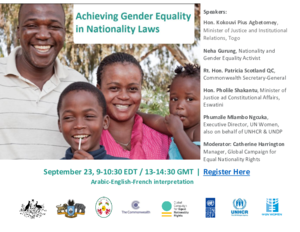
Achieving Gender-Equal Nationality Laws In Africa
Published: December 28, 2018
Roughly 50 countries globally have nationality laws that discriminate on the basis of gender. Twenty-five countries retain nationality laws that deny women the right to pass their nationality to their children on an equal basis with men. While most African countries uphold citizens’ equal right to pass citizenship to their children, roughly one-third of the countries that deny women the right to pass their nationality to their children on an equal basis with men are in Africa. Approximately 40 percent of African countries deny women the right to pass their nationality to their foreign spouse on an equal basis with men. Several countries in the region have nationality laws that also discriminate against women in their ability to change or retain their nationality. Today, ending gender discrimination in nationality laws is a critical area of reform needed to achieve gender equality and combat statelessness. One of just a few root causes of statelessness, gender discrimination in nationality laws undermines women’s equal status in society and the family and implicitly ascribes women a second-class citizenship status.
This publication provides a brief overview of reforms to uphold gender equality in the nationality laws of Algeria, Botswana, Kenya, and Senegal—all countries where women and men have the equal ability to confer nationality on children and spouses. It also outlines partial reforms enacted in Madagascar and Sierra Leone, where citizens now have the equal right to confer nationality on children but where further reforms are needed to uphold citizens’ equal right to confer nationality on spouses. This publication does not provide detailed information on the important movements for gender-equal nationality rights in these countries—movements that advanced women’s equal citizenship and the welfare and security of countless affected families. The second half of the publication summarizes the significantbenefits to citizens, their families, and society when gender-equal nationality rights are upheld.
Universal Periodic Review Country Submission for the United Arab Emirates
Published: January 05, 2018
The Global Campaign for Equal Nationality Rights and Institute on Statelessness and Inclusion have prepared this submission regarding gender discrimination in the nationality laws of the United Arab Emirates in order to inform the country’s review during the 29th Session of the Universal Periodic Review (UPR), 15-26 January 2018.
The United Arab Emirates is one of the twenty-five remaining countries that deny women the right to confer nationality on their children on an equal basis with men. It is also one of roughly fifty countries to deny women the ability to confer nationality on spouses on an equal basis with men.
Gender discrimination in nationality laws result in myriad human rights violations, treat women as second-class citizens, and are a leading cause of statelessness. As global momentum builds for the eradication of gender discrimination in nationality laws, it is critical that United Nations Member States leverage the UPR process to sustain calls for reform.
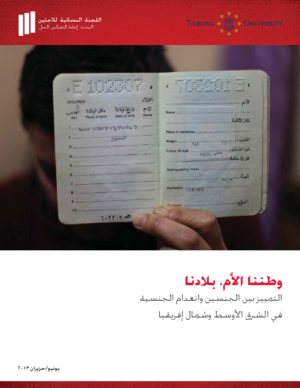
Our Motherland, Our Country: Gender Discrimination and Statelessness in MENA (Arabic edition)
Published: July 24, 2017
In order to understand the impact of discriminatory
nationality laws on women, their children and their
spouses, the Women’s Refugee Commission and the
Statelessness Programme at Tilburg University, undertook
a year-long project that researched two countries
in the Middle East that still have discriminatory nationality
laws—Jordan and Kuwait—and two countries in
North Africa—Egypt and Morocco—that have changed
their nationality laws to allow women as well as men to
pass their nationality onto their children. The research
included a review of nationality legislation of the four
countries and field assessments in each country to interview
affected women, men and their children. The
report brings out their experiences and their voices.
لكي نتمكن من فهم تأثير قوانين الجنسية التمييزية على
النساء وأطفالهن وأزواجهن، نفذت اللجنة النسائية للاجئين
وبرنامج انعدام الجنسية في جامعة تيلبورغ، مشرو ً عا لمدة عام
أجرى أبحاثًا في بلدين في الشرق الأوسط لا يزال لديهما قوانين
جنسية تمييزية—الأردن والكويت—وبلدين في شمال إفريقيا—
مصر والمغرب—قاما بتغيير قوانين الجنسية الخاصة بهما
للسماح للنساء والرجال بنقل جنسيتهم إلى أطفالهم.
واشتمل البحث على مراجعة لتشريعات الجنسية في البلدان
الأربعة وتقييمات ميدانية في كل بلد لإجراء مقابلات مع النساء
المتضررات والرجال وأبنائهم. ويبرز التقرير تجاربهم وأصواتهم.
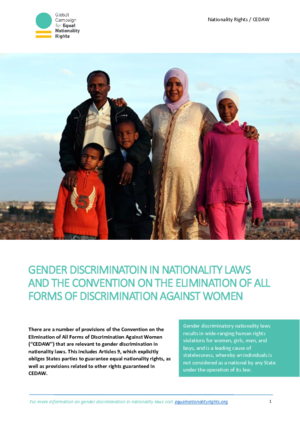
CEDAW and Nationality Laws Guide
Available in English, French and Arabic
Published: July 05, 2017
This reference guide highlights key international human rights provisions found in CEDAW that are relevant to women’s nationality rights and individuals affected by gender discrimination in nationality laws, including stateless persons. It is addressed to all stakeholders who may wish to use this international human rights instrument to advance gender equal nationality rights and improve the enjoyment of human rights by affected persons.
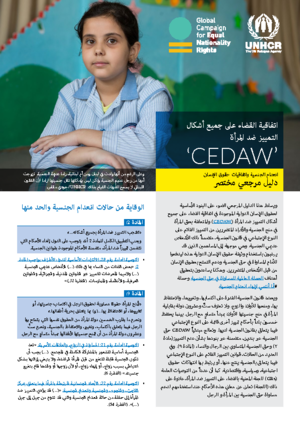
CEDAW and Nationality Laws Guide – Arabic
Published: July 05, 2017
This reference guide highlights key international human rights provisions found in CEDAW that are relevant to women’s nationality rights and individuals affected by gender discrimination in nationality laws, including stateless persons. It is addressed to all stakeholders who may wish to use this international human rights instrument to advance gender equal nationality rights and improve the enjoyment of human rights by affected persons.
—-
ويسلط هذا الدليل املرجعي الضوء عىل البنود األساسية لحقوق اإلنسان الدولية املوجودة يف اتفاقية القضاء عىل جميع أشكال التمييز ضد املرأة )CEDAW )واملتعلقة بحق املرأة يف منح الجنسية واألفراد املترضرين من التمييز القائم عىل النوع اإلجتامعي يف قانون الجنسية، متضمناً ذلك األشخاص عدميي الجنسية. وهي موجهة إىل املساهمني الذين قد يرغبون باستخدام وثيقة حقوق اإلنسان الدولية هذه ليدفعوا لألمام املساواة يف حق الجنسية ودعم التمتع بحقوق اإلنسان من قبل األشخاص املترضرين. وهكذا يساعدون بتحقيق أهداف الحملة العاملية للمساواة يف حق الجنسية وحملة #أنا أنتمي إلنهاء انعدام الجنسية.
The State We’re In: Ending Sexism In Nationality Laws
Published: May 10, 2017
Equality Now’s report documents a wide range of harmful consequences and calls on governments to remove all discrimination against women in passing on their nationality to their husbands and children. It highlights those countries where women do not have the same rights as men to convey their nationality, engendering much hardship for the families concerned. The annex provides the relevant legal text for each of the 50+ countries that retain gender-discriminatory provisions in their nationality laws.

Barbados Submission to the CEDAW Committee
Published: April 10, 2017
This submission is intended to inform the Committee on the Elimination of Discrimination Against Women’s review of Barbados at its 67th Session of the Committee (03 Jul 2017 – 21 Jul 2017). The submission focuses on gender discrimination in the nationality laws of Barbados in violation of its commitments under the Convention on the Elimination of All Forms of Discrimination Against Women.
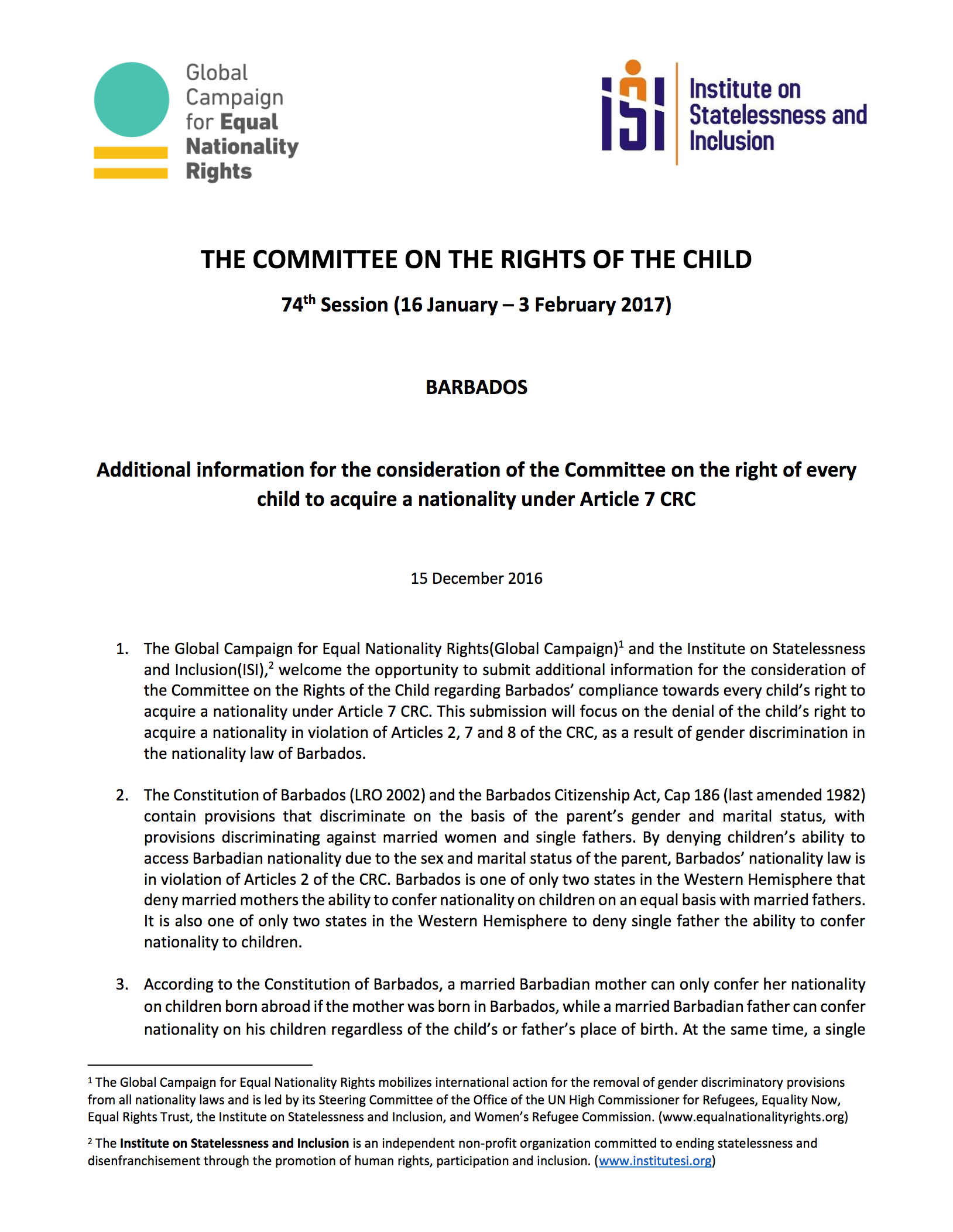
Barbados Submission to the Committee on the Rights of the Child
Published: December 15, 2016
The Global Campaign for Equal Nationality Rights (Global Campaign) and the Institute on Statelessness and Inclusion (ISI), welcome the opportunity to submit additional information for the consideration of the Committee on the Rights of the Child regarding Barbados’ compliance towards every child’s right to acquire a nationality under Article 7 CRC. This submission will focus on the denial of the child’s right to acquire a nationality in violation of Articles 2, 7 and 8 of the CRC, as a result of gender discrimination in the nationality law of Barbados.

Joint Submission on Lebanon to the Committee on the Rights of the Child
Published: December 12, 2016
In this submission, Equality Now, the Committee for the Follow-Up on Women’s Issues (CFUWI), the Lebanese Council to Resist Violence against Woman (LECORVAW), and the Global Campaign for Equal Nationality Rights provide information and highlight concerns about sex discrimination in the law with regard to nationality in Lebanon in order to reform the country’s review by the Committee on the Rights of the Child.
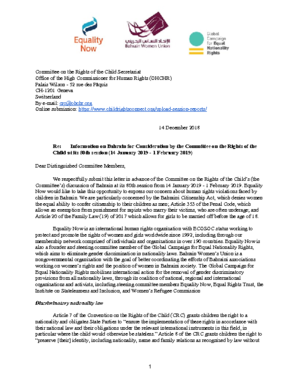
Joint submission on Bahrain to the Human Rights Council of the United Nations
Published: September 22, 2016
In this submission, Equality Now, the Bahrain Women’s Union, and the Global Campaign for Equal Nationality Rights provide information and highlight concerns about sex discrimination in the law with regard to nationality in Bahrain. The submission also includes key recommendations regarding action by the government of Bahrain to better address this area of concern.
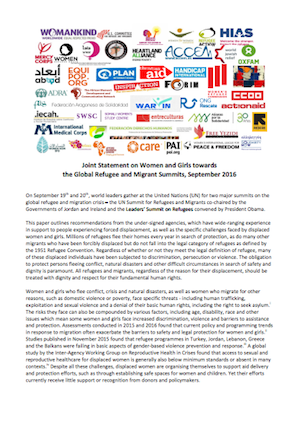
Joint Statement on Women & Girls towards the Global Refugee & Migrant Summits
Published: September 19, 2016
On September 19th and 20th, world leaders gather at the United Nations (UN) for two major summits on the global refugee and migration crisis – the UN Summit for Refugees and Migrants co-chaired by the Governments of Jordan and Ireland and the Leaders’ Summit on Refugees convened by President Obama.
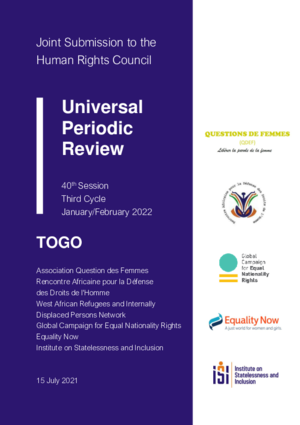
Submission for the Universal Periodic Review of Togo – Sex Discrimination in the Nationality Law
by Equality Now and Question des Femmes
Published: May 16, 2016
In this submission, Global Campaign Steering Committee member Equality Now and the Togolese NGO Questions de Femmes provide information to the Twenty-Sixth Session of the UPR Working Group of the Human Rights Council to inform the Universal Periodic Review of Togo. The submission highlights concerns about sex discrimination in the law with regard to nationality in Togo and includes key recommendations for action by the government of Togo to better address this area of concern.
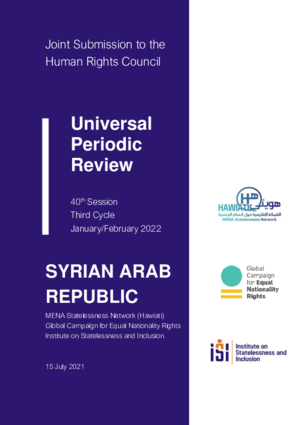
Joint submission on Syria to the Human Rights Council of the United Nations
Published: March 25, 2016
The Global Campaign for Equal Nationality Rights and the Institute on Statelessness and Inclusion made the following submission to the 26th Session of the Human Rights Council to inform the Universal Periodic Review of the Syrian Arab Republic. The submission focuses on human rights violations due to gender discrimination in Syria’s nationality law, including statelessness, and violations of the State’s obligations to uphold the right to non-discrimination and women’s equal human rights.
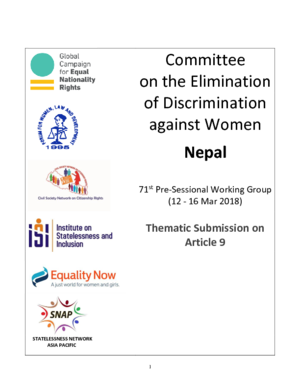
Joint Submission on Nepal to the Human Rights Council of the United Nations
Published: July 17, 2015
The Nepal Civil Society Network of Citizenship Rights, the Global Campaign for Equal Nationality Rights and the Institute on Statelessness and Inclusion submission to the Universal Periodic Review (UPR) in relation to Nepal focuses on the issue of gender discrimination in Nepal’s citizenship law that has a detrimental impact on Nepali women and their families; both men and women. (Submitted for the 23rd Session of the Universal Periodic Review, 2015)
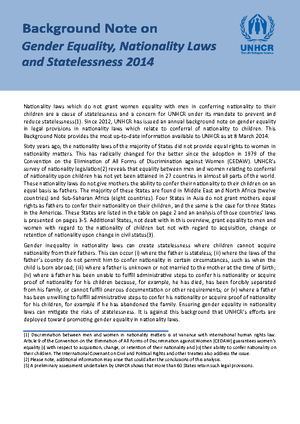
UNHCR and CRTD. A Regional Dialogue on Gender Equality, Nationality and Statelessness : Overview and Key Findings
January 2012
Published: July 17, 2015
UNHCR and the Collective for Research and Training on Development – Action (CRTD-A), a women’s rights NGO in Lebanon, co-convened a Regional Dialogue on Gender Equality and Statelessness in Beirut from 17-19 October 2011. The objectives of this meeting were to hear testimonies of how families from countries in the MENA region have been affected by gender-discriminatory laws that deny mothers the right to pass their nationality on to their children, in some instances resulting in statelessness; analyze these experiences from the complementary perspectives of gender equality and prevention of statelessness; and share regional good practices and forward-looking strategies for achieving reform to gender discriminatory nationality laws in countries throughout the region.
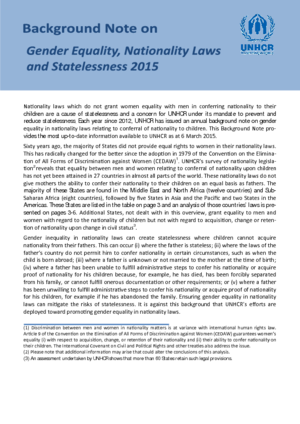
Background Note on Gender Equality, Nationality Laws and Statelessness 2015
Published: July 17, 2015
Nationality laws which do not grant women equality with men in conferring nationality to their children are a cause of statelessness and a concern for UNHCR under its mandate to prevent and reduce statelessness. Sixty years ago, the majority of States did not provide equal rights to women in their nationality laws. This has radically changed for the better since the adoption in 1979 of the Convention on the Elimination of All Forms of Discrimination against Women (CEDAW). However, 27 countries continue to deny women equal rights to confer nationality on their children and over 50 countries maintain other forms of gender discrimination in their nationality law, including denying women equal rights to confer nationality to spouses. Today, there is a growing willingness and commitment by States to take action to achieve gender equality in nationality laws.
Our Motherland, Our Country: Gender Discrimination and Statelessness in the Middle East and North Africa
Published: July 17, 2015

